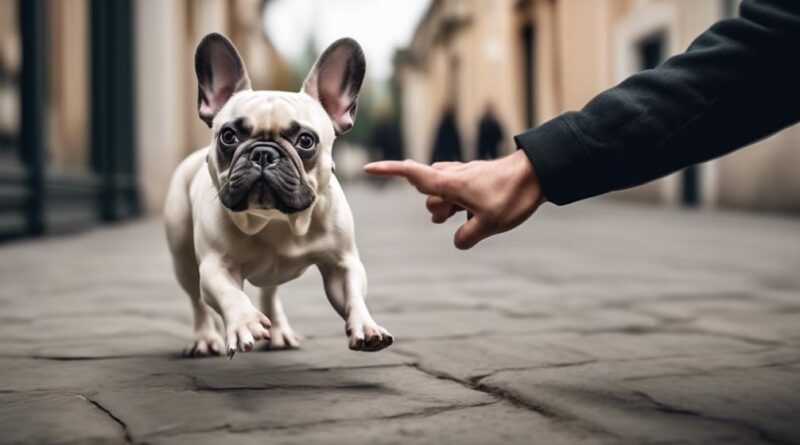How French Bulldogs React to Strangers: A Guide
When it comes to understanding how French Bulldogs react to strangers, it's like deciphering a complex puzzle with each piece revealing a different aspect of their unique personality.
You may have noticed that your Frenchie's behavior around new people is not always predictable. From their friendly and affectionate nature to their cautiousness and potential for shyness, there's a lot to consider.
But what factors influence their reactions, and how can you help them navigate encounters with strangers? Let's explore the intricate world of French Bulldog behavior and discover effective strategies for managing their interactions with unfamiliar faces.
Friendly and Affectionate Nature
French Bulldogs are known for their friendly and affectionate nature, often seeking out attention and companionship from their owners. When it comes to being loving companions, French Bulldogs take the cake. They thrive on human interaction and are known for their welcoming demeanor towards those they know and love. This breed is often described as affectionate, patient, and eager to please, making them a great addition to any household.
French Bulldogs have a special way of showing their affection. They aren't shy about expressing their love and are often found snuggled up next to their owners, seeking physical touch and closeness. Their loving companionship extends beyond just their owners, as they're also known to be friendly towards strangers, often greeting them with a wagging tail and a warm demeanor.
Their welcoming demeanor is a defining trait of the breed. French Bulldogs are known to be social butterflies, enjoying the company of both familiar faces and new acquaintances. Their friendly and affectionate nature makes them excellent companions for families, as they're often gentle and patient with children. Their loving and welcoming nature also makes them great therapy dogs, bringing comfort and joy to those in need.
Alertness and Watchful Behavior
With their affectionate nature, French Bulldogs also exhibit a keen alertness and watchful behavior that make them reliable companions in any household. This breed's natural instincts make them excellent guard dogs, and their protective instincts can provide a sense of security to their owners and their property.
Here are some key points to understand about the alertness and watchful behavior of French Bulldogs:
- Guard Dog: French Bulldogs are naturally alert and make excellent guard dogs. Their keen senses and strong protective instincts make them highly attuned to their surroundings, and they're quick to alert their owners of any potential threats.
- Vigilant Watchfulness: These dogs are constantly vigilant, keeping a watchful eye on their surroundings. You can rely on them to be aware of any changes in their environment and to react accordingly.
- Protective Instincts: French Bulldogs have a strong protective instinct towards their family members and their home. They'll not hesitate to take action if they sense any potential danger.
- Quick to React: With their alert nature, French Bulldogs are quick to react to any unfamiliar or suspicious activity. They aren't easily caught off guard and can be counted on to act swiftly in response to any perceived threats.
- Peace of Mind: The alertness and watchful behavior of French Bulldogs provide their owners with a sense of security and peace of mind, knowing that their loyal companions are always on the lookout for their well-being.
Initial Wariness and Cautiousness

Upon encountering strangers, French Bulldogs typically exhibit initial wariness and cautiousness as they assess the unfamiliar individuals and their intentions. This behavior is rooted in their natural instincts to protect themselves and their owners from potential threats. When a stranger approaches, you may notice your French Bulldog displaying signs of wariness such as standing still, raised ears, and a focused gaze. It's important to acknowledge and respect your dog's initial wariness when introducing them to new people.
To help your French Bulldog overcome their wariness of strangers, it's essential to focus on building trust and creating positive associations. Start by allowing your dog to approach the stranger at their own pace, without forcing interaction. Encourage the stranger to remain calm and avoid making sudden movements that could startle your dog. Offering treats or toys can help to create a positive association with the stranger's presence. By using positive reinforcement and giving your French Bulldog the time they need to adjust, you can help them build trust and become more comfortable around new people.
Remember that every dog is unique, and some French Bulldogs may take longer to overcome their wariness of strangers. Patience, understanding, and positive reinforcement are key in helping your dog feel more at ease when meeting new individuals. With time and gentle encouragement, your French Bulldog can learn to approach strangers with less wariness and more confidence.
Potential for Shyness or Timidity
When introducing your French Bulldog to new people, it's important to be mindful of their potential for shyness or timidity and approach interactions with sensitivity and patience. French Bulldogs, like any other breed, may exhibit shyness or timidity in certain situations. However, with the right approach and guidance, you can help your Frenchie overcome these tendencies and build confidence in social settings.
- Gradual Exposure: Introduce your French Bulldog to new people gradually, starting with familiar faces before moving on to strangers. This gradual exposure can help them acclimate to new individuals at their own pace.
- Positive Reinforcement: Use positive reinforcement techniques such as treats, praise, and affection to encourage your Frenchie to associate new people with positive experiences. This can help them overcome their shyness and build confidence in social interactions.
- Patience and Understanding: Be patient and understanding when your French Bulldog shows signs of shyness or timidity. Avoid forcing them into interactions and instead give them the time and space they need to feel comfortable.
- Socialization Opportunities: Provide your Frenchie with ample opportunities for socialization from a young age. Exposing them to different people and environments can help them develop confidence and ease around strangers.
- Professional Training: Consider enrolling your French Bulldog in obedience classes or working with a professional trainer to address their shyness and build their social skills in a controlled environment.
Socialization and Stranger Training
To assist your French Bulldog in becoming more comfortable around strangers, prioritize socialization and stranger training to build their confidence and ease in new environments. Stranger desensitization is a crucial aspect of socialization for French Bulldogs. Expose your dog to various people of different ages, genders, and appearances in a controlled and positive manner. Start with low-stress environments and gradually increase the exposure, always ensuring that your dog feels safe and secure. This gradual approach allows your French Bulldog to become more familiar with strangers and reduces the likelihood of fear or anxiety around new people.
Positive reinforcement training is highly effective in helping your French Bulldog feel more at ease around strangers. When your dog displays calm and confident behavior in the presence of strangers, reward them with treats, praise, or toys. This reinforces the idea that encountering strangers results in positive outcomes, encouraging your dog to associate strangers with positive experiences. Additionally, providing a safe space, such as a designated area or crate, where your French Bulldog can retreat to if feeling overwhelmed by strangers can help them feel secure and in control of the situation.
Consistency and patience are key when implementing socialization and stranger training. It's essential to remain calm and supportive during the process, as your French Bulldog will pick up on your cues. By gradually exposing your dog to strangers and using positive reinforcement techniques, you can help them develop confidence and comfort when encountering new people.
Possessiveness and Protective Instinct
If your French Bulldog exhibits possessiveness or a protective instinct, it's important to address these behaviors through consistent training and positive reinforcement. French Bulldogs, like many other breeds, can display possessive behaviors or a strong protective instinct. Here are some key points to consider when dealing with these traits:
- Early Socialization: Introduce your French Bulldog to various people and situations from a young age to help them feel more comfortable and secure in different environments. This can help reduce possessiveness and over-protectiveness by creating a well-adjusted and confident dog.
- Establish Clear Boundaries: Set clear boundaries and rules for your French Bulldog to follow. Consistent training and structure can help them understand their role in the household, reducing the likelihood of possessive behaviors.
- Positive Reinforcement: Use positive reinforcement techniques to encourage desirable behaviors. Reward your French Bulldog for calm and non-possessive reactions to strangers, reinforcing the desired response.
- Seek Professional Help if Needed: If possessiveness or protective instincts become problematic or unmanageable, seek guidance from a professional dog trainer or behaviorist. They can provide tailored strategies to address these behaviors effectively.
- Avoid Encouraging Possessive Behaviors: Refrain from encouraging possessive behaviors, such as overprotective reactions to strangers. Instead, redirect their focus and reward calm and non-aggressive responses.
Understanding and addressing possessiveness and protective instincts in French Bulldogs through proper socialization, boundary setting, and positive reinforcement can help foster a well-behaved and balanced canine companion.
Reactions to Different Types of Strangers

Upon encountering different types of strangers, French Bulldogs may exhibit a range of reactions based on their temperament and previous socialization experiences. When encountering strangers with children or pets, French Bulldogs often display a friendly and playful demeanor. They tend to be gentle and tolerant, especially if they've been socialized with children and other animals from an early age. It's important to supervise these interactions to ensure that both the dog and the children or pets are comfortable and safe.
In the case of delivery people or maintenance workers, French Bulldogs may respond with alertness and wariness. Their protective instincts might be triggered, leading them to bark or closely monitor the strangers' movements. This behavior is rooted in their loyalty and protective nature, as they perceive these unfamiliar individuals as potential threats to their territory. Proper training and socialization can help mitigate these reactions, teaching French Bulldogs to remain calm and composed in the presence of such strangers.
It's crucial for owners to provide positive and controlled exposure to various types of strangers to foster well-rounded social skills in French Bulldogs. This can help them distinguish between potential threats and harmless visitors, leading to more balanced and controlled reactions in different situations.
Managing French Bulldog Reactions
When managing French Bulldog reactions, it's essential to provide positive and controlled exposure to various types of strangers to foster well-rounded social skills and balanced responses. Managing behavior and training techniques play a crucial role in shaping your French Bulldog's reactions to strangers.
Here are some effective strategies to help you manage your French Bulldog's reactions:
- Positive Reinforcement: Use treats, toys, and verbal praise to reward your French Bulldog for calm and friendly behavior around strangers. This positive reinforcement will help them associate strangers with positive experiences.
- Controlled Introductions: Gradually introduce your French Bulldog to different types of strangers in a controlled environment. Start with familiar faces and then gradually expose them to new people, ensuring that the interactions are calm and positive.
- Desensitization Training: Gradually expose your French Bulldog to various stimuli associated with strangers, such as different clothing, hats, or walking aids, to help them become less reactive to unfamiliar appearances.
- Obedience Training: Teaching your French Bulldog basic obedience commands such as 'sit,' 'stay,' and 'leave it' can help you manage their behavior around strangers effectively.
- Professional Assistance: If your French Bulldog exhibits extreme reactions or aggression towards strangers, seeking the help of a professional dog trainer or behaviorist can provide specialized guidance and support.
Frequently Asked Questions
Are French Bulldogs Good Guard Dogs?
French bulldogs have great guard dog potential. Their behavior reflects their natural protective instincts, making them alert and courageous. They may not be as imposing as larger breeds, but they're loyal and will protect their home and family.
With proper training and socialization, French bulldogs can make excellent guard dogs, as they're brave and will alert you to any potential threats.
How Do French Bulldogs React to Strangers in the Home Versus Outside?
When it comes to French bulldog behavior, they may react differently to strangers inside and outside your home. Inside, they might be more protective and wary of unfamiliar people, while outside they may be more curious and friendly.
Stranger interaction can vary depending on the individual dog's personality and socialization. It's important to observe and understand your French bulldog's behavior to ensure they feel safe and comfortable in different environments.
Can French Bulldogs Be Trained to Be More Sociable With Strangers?
Yes, French Bulldogs can be trained to be more sociable with strangers. Utilize positive reinforcement training methods and proper socialization techniques.
Gradually expose your Frenchie to new people in controlled environments, rewarding calm and friendly behavior. Consistency and patience are key in building their confidence and trust around strangers.
With time and effort, your French Bulldog can learn to be more comfortable and friendly with unfamiliar individuals.
Do French Bulldogs Tend to Be More Wary of Certain Types of Strangers?
When it comes to stranger interactions, French Bulldogs may be more wary around certain types of strangers. It's important to use proper socialization techniques to help them become more comfortable.
With consistent exposure to different people and positive reinforcement, they can learn to be more at ease. It's crucial to introduce them to various individuals, environments, and situations to build their confidence and trust in new people.
What Are Some Common Signs That a French Bulldog Is Feeling Possessive or Protective Around a Stranger?
When a French Bulldog feels possessive or protective around a stranger, they may display certain body language cues like stiff posture, raised hackles, or intense staring. Aggression may also be evident through growling or barking.
To address this behavior, consistent training methods and socialization are essential. Introducing your Frenchie to various people and environments from an early age can help them feel more at ease around strangers and less inclined to act possessive or protective.
Conclusion
In conclusion, French bulldogs are known for their friendly and affectionate nature. However, they can also be cautious and wary of strangers. It's important to socialize and train them to interact positively with different types of people.
With proper management and understanding of their reactions, French bulldogs can be well-adjusted and welcoming to strangers.
